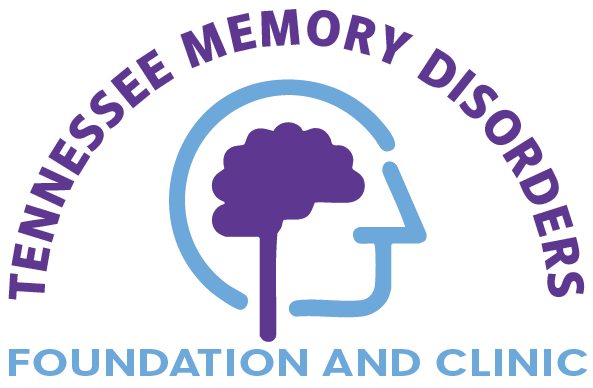Our Services
Tennessee Memory Disorders Foundation and Clinic offers clinical care and support for neurodegenerative dementia syndromes, including Alzheimer’s disease, memory disorders, and other cognitive concerns.
The New Patient Experience
The new patient experience at the Tennessee Memory Disorders Clinic involves two appointments. The first visit is a comprehensive evaluation with our specialty nurse practitioners. This visit lasts approximately two hours and requires a family member or close friend to provide important input. The second visit is a diagnostic follow-up, during which we review the condition and care plan or recommend additional testing if needed.
Your First Visit
At TMDF, we provide research and clinical care for adults aged 55 and older experiencing memory problems. Individuals under 55 who have a family history of Alzheimer’s disease or other concerning symptoms may also be eligible for treatment and possible enrollment in clinical trials.
Because of the nature of memory loss, patients must be accompanied by someone who knows them well, such as a family member or friend, at every visit.
Pursuant to clinic policy, we are unable to provide physical assistance to patients of any kind including to and from vehicles. Please plan accordingly if mobility support is needed.
The first visit includes:
Neurocognitive Testing
Our testers use “paper and pencil” tests, oral questions, sensory and other measures to assess memory, language, perception and concentration.
Comprehensive Physical Exam & Medical History
The patient will undergo a neurological exam and a physical exam. The team will ask questions about the patient’s medical history and symptoms. The family member or friend will be asked to provide the history of symptoms for those who have difficulty recognizing symptoms.
Orders for Brain Imaging and Laboratory Testing
The provider will explain the purpose of additional diagnostic studies, such as brain imaging, that may be ordered at this time.
MRI Brain
Magnetic resonance imaging (MRI) of the brain is a safe and painless test that uses a magnetic field and radio waves to produce pictures of the brain.
An MRI scanner consists of a large, doughnut-shaped magnet with a tunnel in the center. Patients lie on a table that slides into the tunnel. We recommend centers with larger openings or the option of sedation to assist patients with claustrophobia or anxiety.
CT Brain
A computed tomography (CT) scan is a painless test that uses a doughnut-shaped machine to take pictures of the brain with special X-rays.
PET/CT Scan
Positron emission tomography (PET) is a specialized technology that uses a radiotracer to show chemical and functional changes in the brain.
A common type of radiopharmaceutical, fluorine-18 FDG (fluorodeoxyglucose), acts like sugar. Because the brain uses sugar for fuel, after fasting or lowering blood sugar, the radioactive sugar is absorbed by the brain.
Amyloid PET Scan
An amyloid PET scan uses a radiotracer designed to bind to amyloid plaques in the brain, one of the hallmarks of Alzheimer’s disease. The scan provides images that help determine whether abnormal amyloid buildup is present. This test is especially useful in clarifying a diagnosis when symptoms are uncertain or overlap with other conditions.
Lumbar Puncture
A lumbar puncture, or spinal tap, is a medical test that involves collecting a small sample of cerebrospinal fluid (CSF) from the lower spine to examine proteins such as amyloid plaques and tau tangles. CSF is a clear liquid that cushions the brain and spinal cord. This procedure is performed with X-ray guidance at a partner radiology clinic by interventional radiologists.
Genetic Testing
Genetic testing looks for missing or defective genes to determine whether a disease is inherited. This information may affect the treatment plan. A small blood sample or a swab of the inside of the mouth is used to analyze the patient’s genetic profile.
Blood-Based Biomarkers
Blood tests are now available that measure certain proteins linked to Alzheimer’s disease and related dementias. These include amyloid and tau proteins, as well as other markers of neurodegeneration.
One example is a test for phosphorylated tau (p-tau217), which can indicate abnormal tau buildup in the brain. Other blood-based tests can help identify amyloid changes or provide information about overall brain health.
These tests are less invasive than lumbar puncture or imaging studies and can support diagnosis, guide treatment decisions, and determine eligibility for new therapies. However, they may still be combined with imaging or spinal fluid testing for confirmation.
Your Second Visit
(Diagnostic follow-up)
Before the second visit, the doctor will complete a full review of the patient’s case with the care team. This includes reviewing prior cognitive testing, laboratory results, and imaging studies.
During the appointment, the doctor will discuss all results, explain the diagnosis, and review the treatment and care plan. If a diagnosis is made, patients will receive a take-home information packet.
In some cases, additional testing may be required before a diagnosis can be confirmed. When this occurs, another visit will be scheduled after the necessary testing or imaging is completed. If appropriate, medications may be started, and patients may also be considered for available clinical trials.
Routine Follow-Up Visits
Once a diagnosis has been established, follow-up visits will be scheduled with our nurse practitioners. Some visits may also be conducted by the doctor. Cognitive screening is performed every six months to monitor changes over time.
Cash payments are not accepted for patient services, including copays and visit-related charges.
